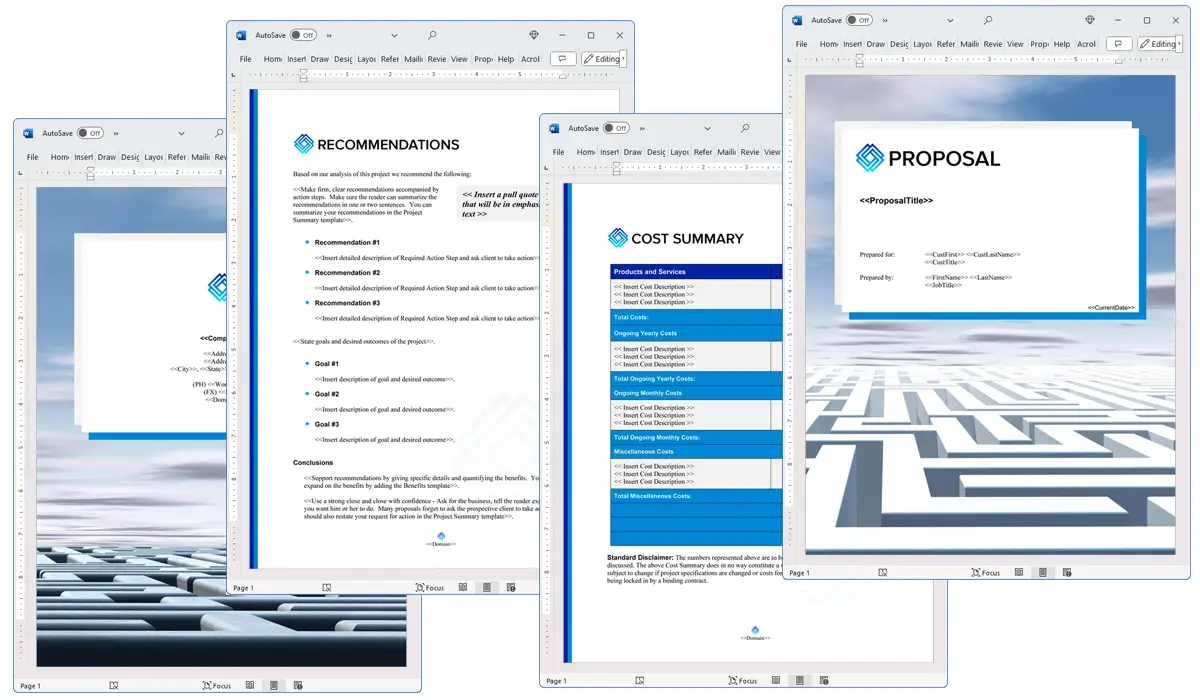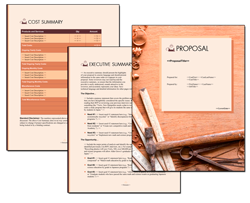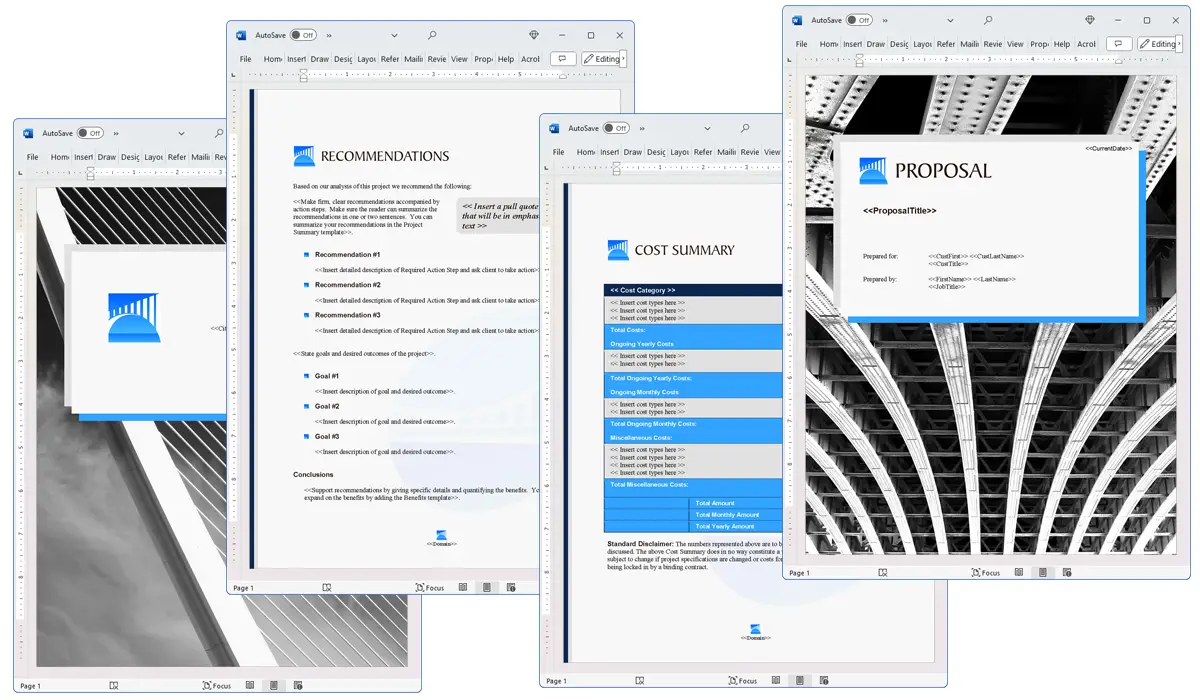What is the Life Cycle chapter used for?
Proposal Kit Professional Bundle adds more design themes, all six Contract Packs,
a project management library, and Expert Edition software.

Illustration of Proposal Pack Contemporary #22
We include this Life Cycle chapter template in every Proposal Pack, along with thousands more. You assemble this chapter with others in various combinations to create custom-tailored business proposals, plans, reports, and other documents. Proposal Packs apply custom visual designs to the templates, giving the final documents a consistent professional finish.
 DOWNLOADABLE, ONE-TIME COST, NO SUBSCRIPTION FEES
DOWNLOADABLE, ONE-TIME COST, NO SUBSCRIPTION FEES
Overview of the Life Cycle Chapter
In business proposals, clarity and comprehensive detail are important to convey the depth and scope of a project or product. The Life Cycle chapter in the Proposal Kit library serves this purpose by providing a structured way to describe the progression or development stages of an organism, product, project, system, or record. When assembling a custom proposal document, including this chapter helps outline the temporal aspects, phases, or maturity stages of the subject in question, ensuring that potential clients or partners understand the development and maintenance involved.
How is the Life Cycle Chapter Used?
The Life Cycle chapter is and can be adapted for various types of proposals. It is used to articulate how something begins, develops, and sometimes concludes. This can include detailing the inception, growth, maturity, and potential decline of a product, or the start-up, execution, and closure phases of a project. In business proposals, this chapter helps stakeholders get a clear picture of timelines, dependencies, and long-term impacts. It sets realistic expectations for project or product longevity and maintenance, paving the way for informed decision-making.
What is Included in the Life Cycle Chapter?
Typically, the Life Cycle chapter includes:
- Introduction: Briefly introduces the subject and its importance.
- Phases: Detailed descriptions of each stage in the life cycle.
- Duration: Expected time for each phase.
- Dependencies: Elements that must be in place for a phase to progress.
- Outcomes: What results to expect at the end of each phase.
- Maintenance or Decline: Ongoing requirements or how something might degrade.
These elements ensure that all aspects of the life cycle are thoroughly explored and documented, providing a comprehensive overview that supports the proposal's objectives.
Use Case Examples for the Life Cycle Chapter
- Product Development: Describing the research, development, market introduction, and maturation of a new product.
- Software Implementation: Outlining the setup, deployment, optimization, and upgrade stages of software in an IT proposal.
- Construction Projects: Detailing the planning, building, completion, and maintenance phases of a construction project.
- Organizational Change Management: Demonstrating the assessment, implementation, review, and normalization stages in change management initiatives.
These examples illustrate how the Life Cycle chapter can be applied across a variety of industries and proposal types, making it an important component in detailing project or product narratives.
Key Takeaways
- The Life Cycle chapter is fundamental for explaining the stages of development in a proposal.
- It helps set realistic expectations about timelines, dependencies, and outcomes.
- This chapter is adaptable for various industries, including IT, product development, construction, and organizational management.
- Including a Life Cycle chapter makes a proposal more comprehensive and understandable.
- It aids in decision-making by providing a clear outline of each phase of a project or product lifespan.
By incorporating the Life Cycle chapter into business proposals, companies can enhance the clarity and effectiveness of their communication with potential clients or partners, thereby increasing the likelihood of successful engagements.

Illustration of Proposal Pack Construction #7
 What Our Clients Say
What Our Clients SayI have just purchased upgrades for Proposal Pack Wizard and Proposal Pack Contemporary #2. I love the program. Thank You for your time as well as this program."
 4.7 stars, based on 841 reviews
4.7 stars, based on 841 reviewsRelated Chapters
Document Layouts Using the Life Cycle Chapter

The Life Cycle chapter and other chapters are integrated into a Word document as illustrated here in the Proposal Pack Infrastructure #3 design theme. There are hundreds of design themes available, and every design theme includes the Life Cycle chapter template.
A proper business proposal will include multiple chapters. This chapter is just one of many you can build into your proposal. We include the complete fill-in-the-blank template in our Proposal Pack template collections. We also include a library of sample proposals illustrating how companies in different industries, both large and small, have written proposals using our Proposal Packs. This template will show you how to write the Life Cycle.
We include a chapter library for you to build from based on your needs. All proposals are different and have different needs and goals. Pick the chapters from our collection and organize them as needed for your proposal.
Using the Proposal Pack template library, you can create any business proposal, report, study, plan, or document.
 Ian Lauder has been helping businesses write their proposals and contracts for two decades. Ian is the owner and founder of Proposal Kit, one of the original sources of business proposal and contract software products started in 1997.
Ian Lauder has been helping businesses write their proposals and contracts for two decades. Ian is the owner and founder of Proposal Kit, one of the original sources of business proposal and contract software products started in 1997.By Ian Lauder
 Published by Proposal Kit, Inc.
Published by Proposal Kit, Inc.


 Cart
Cart
 Facebook
Facebook YouTube
YouTube X
X Search Site
Search Site